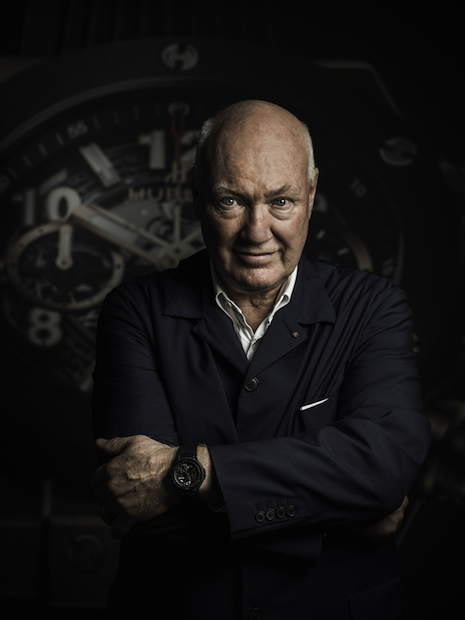
Hublot watchmaking in progress
For several years, Hublot and TAG Heuer have had a large customer base from sub-Saharan African markets such as Nigeria, Angola and Ivory Coast. Both brands are represented in a few other African countries including Kenya and South Africa.
In this Q&A, Jean-Claude Biver, president of luxury conglomerate LVMH’s watch division, shares his outlook on the sub-Saharan luxury market.
Mr. Biver is also CEO of TAG Heuer as well as CEO and minority shareholder of Hublot. He is known for successfully rejuvenating Blancpain and Omega, both owned by the Swatch Group. On the side, Mr. Biver is a renowned cheese-maker, producing for non-commercial purposes. Please read on:
Do you have an Africa strategy? How do you select the countries you want to enter?
We want to show our customer that we want them to meet us. We go where we feel our customers are. We feel that we belong to you, the customer.
If they feel that we fit into their lifestyles, then we don’t need a salesperson. The sales are already complete. The connection and relationship has already been created by the client and Hublot. Our strategy is that basic.
We follow the client to their country and set up home there. The clients have various purchase points which we have reviewed for several years, hence our entry into those markets with representations.
We don’t use big studies or wide analysts. Our process is pragmatic. Client leads us.
What are your strongest African markets? Is it mostly driven by male buyers?
Nigeria and Angola are very strong markets for us despite the ongoing challenges.
South Africa is a small market for Hublot, a very dynamic market, but small. They are our lead markets.
In Nigeria our Hublot distributor is Polo Luxury in Lagos, TAG Heuer is Zakaa in Abuja, and in Angola Hublot is under Largo Ferreira do Mara.
The men buyers in Nigeria is 99 percent and in Angola, too. There is an increase in women buyers. But men lead by buying for themselves or buying for the women, too.
For us to have more women is through the men who we have noticed they influence their buying of the Hublot products.
Globally, revenues from women timepieces are 35 percent.

Jean-Claude Biver, CEO of Hublot Watches, and president of the LVMH watch division. Photographed by Daniel Lopez-Paullada in Geneva, Switzerland
How are your partnerships structured with your distributors?
Our partnerships are very comprehensive. No special requirements. We don’t pretend to understand the local market. There is a crucial need to collaborate and partner with the local people, always.
Our human relations are the boost for our partnerships.
We have a lot of training, which we provide to our local markets to guide them on the Hublot way and life.
We bring our clients here to Switzerland for training on the Hublot language and universe.
Nigeria is in an economic recession and Angola is also challenged due to the oil prices. How has that affected your business?
It has affected us, too. We also feel the stress because as a business we are very interlinked to these markets and other luxury demands.
When art sales go up at Christie’s that boosts us, too. So if sales of luxury brands are going down in the African market due to the current challenges, we are affected.
Ivory Coast was a very strong market, but this has gone down. In the past there was lot of troubles in that market due to politics challenges.
Majority of the Ivoirians purchase their Hublot timepieces from Paris. We are still in Ivory Coast, through our distributor in Abidjan, Galerie Cap Sud.
Are there key challenges that affect your business besides the oil-driven challenges?
Political challenges lead to a lot of market insecurities and currency fluctuations.
All these make business planning a challenge for us.
When a country has a president and the president changes in five years, yet we have done our business planning for more than five years, it becomes a challenge for us because most new governments change the law.
Most new governments make very many changes, from the law to policies, and these can have negative effects on business.
If the laws could remain fixed, it gives investors the courage to invest and the confidence for us to remain in that market for a long time.
Is there a significant difference in the buying behavior of the African clients in comparison to the European clients?
The buying behavior differs in various countries, but, the higher you are in the pyramid, the more the tastes are unified with little or very small differences.
When you look at preferences by the Angola and Nigeria clients, you will see there is a demand for watches with stones. The men want pieces with diamonds.
The diamond seduction plays a huge role to the men.
In the Nordic countries, the clients prefer more gold.
There is also a huge desire for bracelets with gold from the African market.
When you look at other markets, there is specific communication in terms of advertisements for that region such as the Middle East.
Our largest stores in terms of revenue: Dubai is the first store and the second store is [also] in Dubai.
Globally, our highest turnover for the last 10 years has been from Dubai.
Hence our creating that communication geared specifically with that region in focus.

Maryanne Maina runs The Business of African Luxury blog
Maryanne Maina writes on the African luxury market on her blog, The Business of African Luxury. She is based in Paris. Reach her at maryanne.njeri@gmail.com.
from Jewelry – Luxury Daily https://www.luxurydaily.com/lvmh-watch-chief-jean-claude-biver-talks-hublot-strategy-in-africa/
via Your #1 Source to Finding Luxury & Designer Goods, Handbags & Clothes at or Below Wholesale: Click Here.
No comments:
Post a Comment